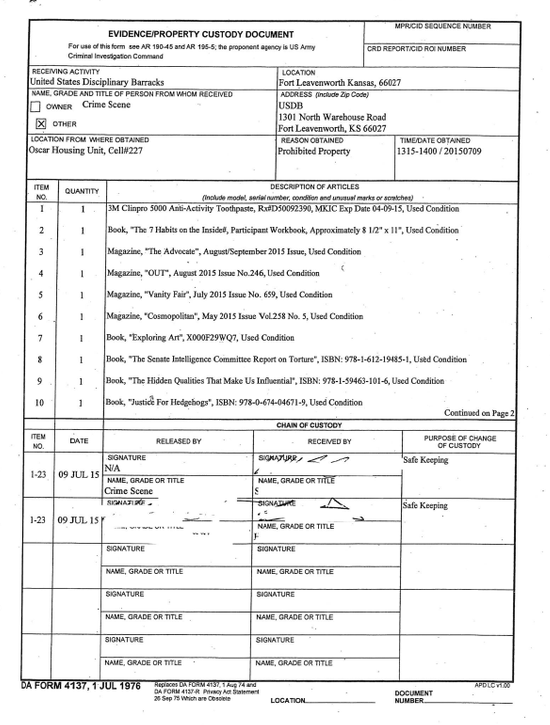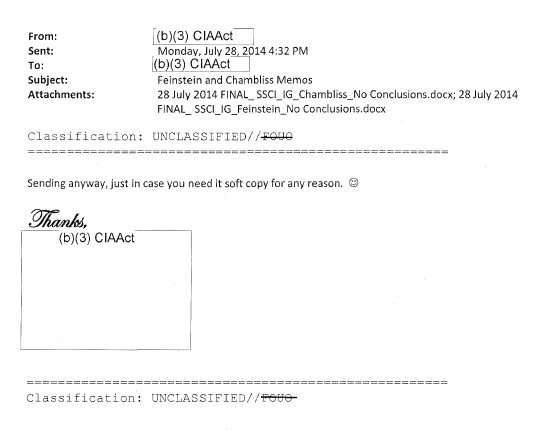Democrats and Republicans do not agree that waterboarding to capture terrorists was a crime, but many do agree it was a blunder.
That’s the central wisdom offered by Eli Lake, in a piece arguing against a Human Rights Watch report calling on renewed accountability for torture based on the evidence presented in the Senate Torture Report.
It’s a bit of a muddle. Obviously, Lake’s reference to waterboarding invokes the understanding of torture prior to the SSCI Report, which revealed far more than waterboarding, including anal rape masquerading as rectal feeding. If there’s a consensus he’s defending, it’s a consensus about waterboarding and “rectal feeding.”
By the end of his piece, he argues both that his claimed consensus is breaking down, and that it still holds — though here, again, he’s focusing on waterboarding, not the anal rape that’s also at issue.
At the end of the Obama administration, that bipartisan consensus is beginning to erode. In 2008, both the Democratic (Obama) and Republican (Senator John McCain) candidates opposed torture and favored closing Guantanamo. In 2015 Donald Trump has come out enthusiastically for waterboarding, pledging to authorize its use again if elected president. Carly Fiorina has defended waterboarding, saying it yielded valuable intelligence, and Jeb Bush has said he is open to repealing the ban on torture imposed by Obama.
Nonetheless other Republicans have held a firmer line. Both Ted Cruz and Rand Paul voted for the anti-torture amendment this summer. Many progressives hope this bipartisan opposition to torture can hold together after Obama leaves office. But this consensus will break apart if a foreign court prosecutes George W. Bush for a crime Barack Obama has long considered a blunder.
Key to understanding Lake’s call to hold off on investigating the torturers, though, is that “anti-torture amendment” that Cruz and Paul support but Carly and Trump might not. Here’s how HRW describes the amendment — which is a call to adhere to the Army Field Manual — in its report.
On June 16, 2015, the US Senate passed an amendment proposed by senators John McCain and Dianne Feinstein to a defense spending bill (the National Defense Authorization Act for Fiscal Year 2016) that if it becomes law, could codify much of what is in Obama’s executive order 13491.[549] The amendment passed in the Senate by a vote of 78-21.[550] The entire bill was then vetoed by Obama over other issues, but a similar provision remained in the compromised version bill which, as of this writing, was expected to be signed into law by the President.[551] It provides that any individual detained by the US in an armed conflict can only be interrogated in ways outlined by the US Army Field Manual on Intelligence Interrogations. It also requires review and updating of the manual within three years to ensure that it reflects current best practice and complies with all US legal obligations and requires that the International Committee of the Red Cross get “notification of, and prompt” access to, all prisoners held by the US in any armed conflict.[552] It is already clear under US law that torture and other ill-treatment is illegal but this requirement would help to more specifically restrain the physical action certain US interrogators could take.[553] However, it is also impossible to know for sure how future administrations will interpret its obligations under the provisions. Additionally, an exemption for the FBI, the Department of Homeland Security, and other federal “law enforcement entities” was added to the compromised version of the bill.
That is, the amendment actually defers the review of techniques in the AFM to the next Administration, potentially a Cruz or Paul one, and doesn’t apply to the FBI.
As I and–especially–Jeff Kaye have pointed out, however, so long as the AFM has Appendix M in it, it can’t be considered a reliable guard against torture. Here’s part of what Kaye had to say about the watered down form in which the amendment was passed.
In what Democratic Senator Dianne Feinstein called a “minor” change to the National Defense Authorization Act (NDAA), a mandated review of the Army Field Manual (AFM) on interrogation was moved from one year to three years from now.
According to a “Q&A” at Human Rights First last June, the mandated review of the AFM was part of the McCain-Feinstein amendment to the NDAA, and was meant “to ensure that its interrogation approaches are lawful, humane, and based on the most up-to-date science.”
The fact there was any “review” at all was really a response to criticism from the United Nation’s Committee Against Torture, which demanded a review of the AFM’s Appendix M, which has been long criticized as allowing abusive interrogation techniques, including isolation, sleep deprivation, and sensory deprivation.
[snip]
While it is a good thing that waterboarding and other SERE-derived forms of torture are not to be allowed anymore — and they were part of an experimental program in any case — long-standing forms of torture are now protected by law because they are part of the Army Field Manual itself.
[snip]
When the pre-veto version of the NDAA was passed — the version that made the Army Field Manual on interrogation literally the law of the land — all the liberals and human rights groups stood up and applauded. None of them mentioned that only months before the UN had criticized the document for use of abusive techniques, and in particular the use of isolation, and sleep and sensory deprivation noted above. Not one.
So what we have now — what Lake would like to uphold — is a deferral of the issue to a potential Republican Administration. That’s not actually a consensus preventing torture at all .
Along the way to Lake’s conclusion showing any consensus against torture isn’t really a consensus against torture, he does cite to some people — Jack Goldsmith (prior to the report, though I suspect he’d still say the same, even though I’m not sure Americans would be as supportive of “rectal feeding” as of a whitewashed description of waterboarding), Glenn Carle, Raha Wala — who oppose reopening the torture question inside the United States. Yet along the way Lake keeps dodging DOJ’s approach to it.
Part of the problem for Human Rights Watch is that the Justice Department has already investigated cases where CIA officers went beyond the legal guidelines, and ended this probe in 2012 without pursuing prosecutions. Pitter pointed out that the federal prosecutor in this case, John Durham, has acknowledged that there were limitations on the evidence available to his team. Nonetheless, the Justice Department has not taken up the issue again.
DOJ has not taken up the issue again because it has refused to open the Torture Report. DOJ can’t very well consider the additional evidence (on top of talking to victims, which HRW did for its report) in the report so long as it doesn’t open it.
Which actually supports HRW’s point: there’s a conspiracy to cover up this torture, and given that it won’t be investigated here, other countries have an obligation to do so.
I actually think Lake misses a way to make his muddled argument much stronger. For one, I think there might be more consensus, blindly defending the US, if a foreign court started prosecuting the US for torture. If HRW gets its way — and foreign governments investigate torture — you’ll see a lot more agreement that the US shouldn’t have to submit to the review of other countries.
But I actually think the fact the anti-prosecution consensus is now defending anal rape and not just waterboarding is key. If we discussed the anal rape as such — as HRW does — it becomes a lot harder to defend (though there is admittedly far too much public tolerance of rape in criminal prisons in this country, to say nothing of Gitmo, to believe more candid discussion that this was really always about rape would sway the public).
The CIA also used “rectal rehydration” or “rectal feeding” which, as described in the Senate Summary, would amount to sexual assault, on at least five different detainees. The practice, not known to have been authorized by the OLC, involved inserting pureed food or liquid nutrients into the detainee’s rectum through a tube, presumably without his consent.[343]The CIA claims this was a medically necessary procedure and not an “enhanced interrogation technique.”[344] The Senate Summary, however, states the procedure was done “without evidence of medical necessity.”[345] Medical experts report that use of this type of procedure without evidence of medical necessity is “a form of sexual assault masquerading as medical treatment.”[346] At least three other detainees were threatened with “rectal rehydrations.” Allegations of excessive force used on two detainees during rectal exams to do not appear to have been properly investigated.[347] One of those two detainees, Mustafa al-Hawsawi, was later diagnosed with chronic hemorrhoids, an anal fissure, and symptomaticrectal prolapse.[348] Some CIA detainees have also reported having suppositories forced into their anus,[349] and other detainees have reported CIA operatives sticking fingers in their anus.[350]
But once you defend anal rape in the terms CIA and its supporters do — that obviously bogus claim that it served as feeding or rehydration — you quickly get to an ongoing practice that is often contraindicated by medical necessity but used for coercion: forced feeding at Gitmo. Excruciating nasal feeding, rather than excruciating rectal feeding.
Here’s what documents submitted in Abu Wa’el Dhiab’s bid lat year to halt his own forced-feeding revealed.
[T]hese documents reveal[] that back on May 7, one of the government’s primary rebuttals to claims about the conditions under which Dhiab was force fed last year was not to refute those claims, but rather to claim he had no standing to complain because he was not — at that point — being force fed. Only 6 days later Gitmo cleared Dhiab to be force fed.
Underlying this discussion is Dhiab’s claim that the government has made the standards for force feeding arbitrary so as to be able to subject those detainees leading force feeding campaigns to painful treatment to get them to stop.
To substantiate that argument, the memorandum unsealed on Friday lays out the changes made to Gitmo’s force feeding protocol in November and December. Those changes include:
- Deletion of limits on the speed at which detainees could be force fed
- Elimination of guidelines on responding to complaints about speed of force feeding
- Change of weight monitoring from daily to weekly
- Deletion of chair restraint guidelines (DOD made a special SOP to cover restraint chair they have thus far refused to turn over)
- Expansion of scenarios in which prisoners can be force fed, including those at 85% of ideal body weight (IBW)
- Deletion of provisions against on-off force feeding
- Discontinuation of use of Reglan (this has to do with potentially permanent side effects from the drug)
- Replacement of phrase “hunger strike” with phrase “medical management of detainees with weight loss”
In response, the government argued (at a time Dhiab was not eating but before they put him on the force feeding list) that he didn’t have standing because he had not been force fed for 2 months.
That is, Dhiab argued compellingly that force-feeding as it sometimes occurs at Gitmo is about coercion through pain, not about medical necessity.
Particularly during periods of broad hunger striking in Gitmo, it hasn’t been (primarily) about feeding prisoners who don’t want to eat. It has been about breaking resistance.
Along with Appendix M, the force-feeding practices at Gitmo are another thing the UN objected to last year.
And while Dhiab has been released, the 75-pound Tariq Ba Odah remains on hunger strike, though the Obama Administration still claims the authority to detain him (Odah has been cleared for release since 2010) and force-feed him, even though years of the process have created severe medical problems with doing so.
On this issue — the use of torturous techniques to coerce submission — I absolutely agree with Lake there is consensus. While some — including Dianne Feinstein and Gladys Kessler (who has seen videos of the process) oppose it — we’re not seeing any legislation to stop the practice and the Executive continues to insist it has absolute discretion in treatment of detainees at Gitmo so long as it is willing to claim it’s doing so for their own good, however dubious those claims may appear. That’s true, in part, because Democrats don’t want to discomfit their president.
And so, in the end, I agree with Lake that there is a consensus in DC. I’d even argue it’s nowhere near as fragile as he suggests by the end of his piece.
But I’d also argue the consensus that it is okay to nasally or rectally “feed” human beings — in some cases, for years — so long as you can excuse the obviously coerced submission involved with a claim of medical necessity is precisely why others should intervene. Lake may be right that there’s a consensus saying “rectal feeding” shouldn’t be prosecuted, but that doesn’t mean that consensus is defensible.





